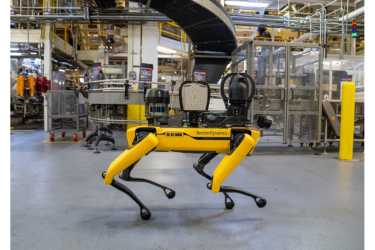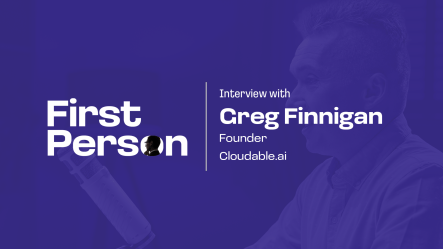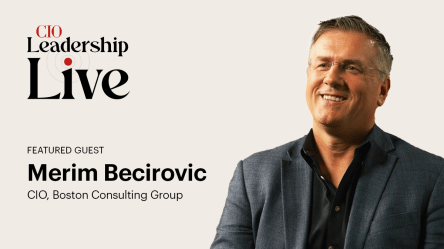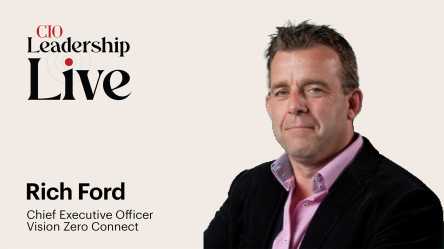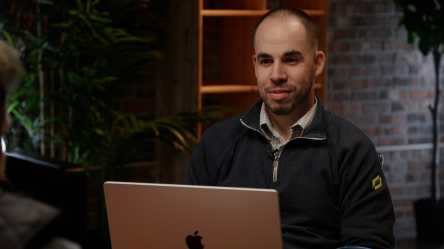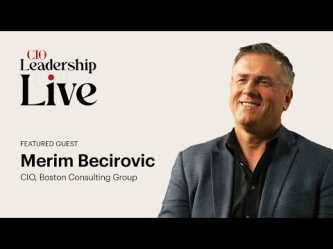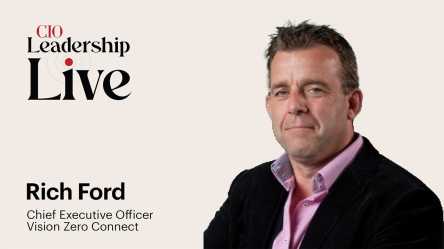First Person Meets… Greg Finnigan: Being your authentic self
Overview
We meet Greg Finnigan, who has navigated a career through hardware to security software and on to cloud; large corporates and startups. Greg tells us about how he found a career he loved through working with the right people, and made career changes based on major trends in IT. He talks about how his biggest mistake was not always being his authentic true self until well into his career, and advises people new to the world of work to focus on working with the right people who have the right values.
Transcript
Matt Egan ( .456) Hello, hello, hello.
Welcome to First Person, the show where we meet the most interesting people in IT and learn from them what makes them tick by focusing only on their firsts. I'm your host, Matt Egan, asking you to enjoy, like and subscribe wherever you find us.
And if you're an interesting person in IT, do let us know. You might be the next First Person. The next voice you will hear will be today's guest. He is Greg Finnegan. founder and expert on cloud technologies.
Greg is passionate about building alliances that fuel innovation across cloud ecosystems and he helps organizations grow. Greg is definitely one of the most interesting people in IT and we are delighted to have him as a guest on First Person.
So Greg, I say welcome and first up, what's the first thing people should know about you? Greg Finnigan ( .329) Thanks Matt.
First thing to know about me is I am the founder of Cloudable.ai. It's my company that I set up about a year ago following a stint that I did at AWS. And I live in Surrey in the UK and winter in McNairia.
Matt Egan ( .098) there you go.
So we have one thing in common, which is I also live in Surrey in the UK, but sadly I don't winter in the Canary Islands. I winter in Surrey in the UK. So Greg, let's move on to our first section, which we call First Things First.
And this is where we like to get to know about our guests by understanding some of their first times.
So I'm really interested to ask you, actually, given your career progression and the things you've done, tell us something about your first job in this industry, something about your first job in IT. Greg Finnigan (
.367) Yeah, my first job was at a very innovative company called Ideal Hardware. It was an IT distributor in the mid 90s, run by three very clever and visionary people. And it was an extraordinary place to start a career, especially at my age.
I was only probably around 21 years old when I joined. I joined into the sales team and the sales team were famously paid commission only. So didn't sell anything, you didn't take anything home. And so, that wasn't the only sort of unique nature of ideal.
We also got the salespeople in every day, 8 a.m. for product training. So we were, you know, experts in what we sold. And… Matt Egan ( .967) Right, wow.
Yeah. Greg Finnigan (
.669) and some other very visionary things back then for the mid-90s.
James Wicks, the MD, set up something called Channel Vision, which was a TV satellite program that bought 4,000 set-top boxes from very early days of satellite and sent them out to our sort top partners to put in their perceptions and showrooms and stuff and then broadcast the programs.
that were demoing the products that we were selling, which was fabulous. And it really built on some of the other firsts that they did. I think they were the first people to put a catalog onto a floppy disk, and then onto CD.
So yeah, I was there for nearly 10 years in various roles, but it was a fabulous place to grow up. And now I still have friends from those days. Matt Egan ( .807) hehe Matt Egan (
.531) Yeah.
It's interesting though, because we wouldn't often hear from people who like start in certainly in distribution and in like sales roles within that, but like that focus on product, which would be a very successful sales tactic, but also is that what made you think that, you know, that, that this was IT was the place you wanted to be?
Like was that, you know, what was it that kind of made you feel like this was the space you wanted to be in? Greg Finnigan (
.357) I'll be brutally honest with you Matt.
Although my sister at the time worked for Microsoft and my father was an IT consultant from the 60s, for me, the reason why I got into the tech industry is because the first job I had, was during my days at college, the opportunity to drive a BMW company car.
So, this is the job for me. Matt Egan ( .463) There you go.
Greg Finnigan (
.509) So I suppose I could summarize that I was interested in the money being made in tech in the 90s. And so that's what attracted me to it. But very quickly it became a place where it was, you know, I met an incredible group of people.
Like I said, I've just said earlier that I'm still friends with many of them from now coming up 30 years ago. And so that's why I stayed. Matt Egan ( .885) For sure.
Yeah. Greg Finnigan (
.085) And it's a very, as an industry, it's tight circles. And it's something that's really stayed with me about how you always come across someone, very few degrees of separation. They say famously it's five for everyone in the world. It's probably two in tech. Matt Egan (
.389) Yeah, no, for sure. And I think, I mean, you're speaking to somebody who was an editor of a magazine about PCs before he owned a PC. mean, like there's two elements in that, right?
There's timing, because certainly that period in mid 90s when there was an explosion in this industry, right? But there's also people. And I think that's something that is really valuable and important. Like, it's not that it's irrelevant what the industry is, but like that.
learning and that grounding, so much of it comes from being with the right group of people, maybe at the right time.
And one of the other questions we ask in this section is to talk about your first great boss or the first thing you think about when I say great boss. And it sounds like we've already kind of hit on that a little bit.
You were working with people who you were there for 10 years, right? I presume that was 10 years of progression. So I guess you were working for bosses and with bosses who saw your potential and helped you develop. Greg Finnigan ( .069) 100%.
Yeah. Immediately when you say great boss, I think a gentleman, a very dear friend now by the name of Alex Tatham. And he was most recently the MD of I think one of the largest private companies in the UK, West Coast.
But for me, he was the MD of Ideal, which became Bell Micro. And so for most of my years there, those 10 years. I reported to Alex. And yeah, he was fantastically encouraging. He's a very flamboyant, full of character, full of life guy.
And he taught me many things that even today, you know, I share with my teams and my kids, you know, things that Alex told me about, you know, all those years ago. Matt Egan ( .005) That's amazing.
then how do you, so then at this point we'd often ask about first promotions, right? But we've done 10 years here, like we've seen your career develop, but how do you get from there to where you are now to founding a business, to working for AWS?
What's the transition? What's the career progression from? Greg Finnigan (
.353) Yeah, I I usually put this into three phases because they happen to be in or around 10 years for each of them. So this first 10 years, one company started out as an account manager, ended up as the GM for Europe, left there and joined Symantec.
Started basically a 10 year… Matt Egan ( .021) Hmm.
Greg Finnigan (
.485) stint in cybersecurity, worked for Symantec and briefly for Spursky and then finally for Intel security or McAfee.
So, yeah, for me, those two phases, quite deliberate, you know, I left Ideal, Bound Micro at a time when it was advantageous to get more into what we call vendor land, know, move up into working for the vendors and I… Matt Egan ( .039) Yeah, for sure.
Greg Finnigan (
.149) I worked in various roles, but they were all pan-European roles, usually in management or account management. And so, yeah, that progression for me was a sort of very warm path for a lot of folks who did that at the time.
And it was probably around 2011, 2012, that I probably took on my biggest promotion. which was taking on the channel team at McAfee where I ran the consumer and small business channel across the mirror.
That was about 20 odd people, 20 odd account managers plus a sort matrix organization of partner marketing and operations and people. Tremendously good fun. I also moved to Ireland for that role. So it was a big sort of… professional and personal change.
so yeah, looking back at those days, that was probably the largest promotion I had, the greatest step that I took in my career. And very enjoyable, I was there for just about four years. Matt Egan ( .028) Yeah.
Matt Egan (
.442) Yeah, we will definitely have minimal degrees of separation if you're working in antivirus and security software in that period. Because as I say, I would have been editing PC magazines around about that time. So that was a whole kind of world.
We'd have all met at CBIT at some point, of engaging in those spaces. But it's interesting that this transition, if you like, from very broadly, like from hardware to… Greg Finnigan ( .503) What?
Greg Finnigan ( .365) I'm sure.
Matt Egan (
.067) security software into, I guess, cloud in the end, actually maps and mirrors to the way the industry has transitioned, right, which does speak to a certain amount of career management on your perspective, right, you were able to see where the opportunities were, or is that just serendipity?
Greg Finnigan ( .883) Yeah.
Greg Finnigan (
.525) No, I suppose that's perhaps being too humble to say that so independently. You know, yes, you're the first person that's pointed that out to me. And yeah, I have gone with the trends there. That's true. mean, cybersecurity is still an incredibly hot industry.
But yes, leaping from that cybersecurity decade, I initially came out of Intel into the startup world. Again, a very conscious choice. Matt Egan ( .763) Yeah.
Matt Egan ( .265) Yeah.
Yeah. Matt Egan ( .285) Mm-hmm.
Greg Finnigan (
.945) fascinated about what I'd heard about the differences between the corporate world and the startup world and wanted to challenge myself but also wanted to you know have those sort of wealth creation moments that I'd heard about and I thought that's it which still hasn't materialised but yeah you're hearing about them Matt Egan ( .809) Yeah.
Matt Egan ( .421) Yes.
Matt Egan (
.613) Yeah, no, I've heard about them too. I keep hearing about them. It's like, what are you saying? Greg Finnigan (
.473) You don't hear about the normal run of things, which is, you know, it's actually just good fun. But yeah, that third phase was moving into startup phase. So I spent a year as an MD of a FinTech startup.
And then I started out on my own with other co-founders, three in total, into probably a business that was before its day. It was a… a clean tech business, a business focused on sustainability. And I did that for just about four years up until the end of 2020.
And it was then that we actually, know, the business had a number of headwinds. So I started looking around for something to do next. And my wife, actually. was working at AWS through those early days of COVID. So I could hear her from my office to her.
And she just seemed to be having so much fun. seemed to be so entrepreneurial. And I to be one of the largest corporates in the world. So it was fascinating for me that how they could create such a culture with a million plus employees.
So yeah, when an opportunity came to join Matt Egan ( .027) Yeah.
Greg Finnigan (
.605) AWS, I jumped at the chance to see if I could really pass their interview process. It was more curiosity and being challenging myself. I never really thought about what happens if they offer me the job. yeah, five one hour interviews back to back. Pretty brutal.
Yeah, and they called me a couple of days later and said, would you come and join us? Matt Egan ( .591) Yeah.
Yay. Matt Egan ( .059) Wow.
Greg Finnigan (
.085) And it was then that I thought, oh, okay, I need to make a decision. So, but it felt very natural to say yes. And of course I've never looked back. It's now being, it's now very much my life, what I do.
I haven't fallen very far from this tree since leaving AWS last year. Matt Egan (
.333) Yeah, but also like what a great set of experiences that bring you to this point, right? Where you're now, you know, probably uniquely qualified in some ways to run the kind of business that you do because of all those, those background experiences. Thank you for sharing that.
That was really insightful and enjoyable. Too successful though. So now we're going to move on to section two, which is what we call first fails because we're not just here for the good stuff, right?
And we do, you and I as I've worked before, I think we agree, we do learn more from our mistakes kind of thing.
So I wonder what is the first thing that comes to mind if I ask you to talk about a mistake you've made, a big mistake you've made. Greg Finnigan (
.101) Yeah, I did give this some thought. When I saw you sort of say, this is the question we want a good answer to. And I thought, wow, what an insightful question. And I want to give everybody a useful answer.
I think my biggest mistake is not being myself. You know, I realised in the, particularly in that 10 year tenure. Matt Egan ( .279) Mm-hmm.
Greg Finnigan (
.381) at distribution that I was adapting quite a lot to the environment that I was in. And it wasn't my natural self, you know, being my work self. And perhaps that's a combination of youth and an experience and all that, perhaps everybody's like that.
But I never grew out of it until probably knocking on 40. I realized actually this adapting is exhausting. Matt Egan ( .833) Mm-hmm.
Greg Finnigan ( .551) It's not genuine.
I people have noticed and are calling me out on it. Not in direct ways, but in indirect ways. And I thought to myself, I don't need to do this anymore. I'm probably, hopefully, good enough being my forensic self.
So yeah, I made a key decision to sort of say, I'm gonna be an open book. Matt Egan ( .647) Hmm.
Greg Finnigan (
.861) as I am and let people make their own decisions based on that. it was a mistake that I repeated over probably two decades. So that's why I probably class it as my first and biggest mistake. And now looking back at it, yeah, go ahead.
Matt Egan ( .049) Yeah.
Matt Egan ( .893) I said it.
No, I was going to say, sorry, I shouldn't have interrupted, but like, thank you, because that's such an insightful answer and we've never had that. Right. And I think it's probably relevant to everybody.
I wonder, so many thoughts were going through my head while you were speaking just then, like, certainly it resonates. Right. And I think we're over a similar age. And I think, I wonder if working practices and cultures are a bit different now.
So maybe it's possible to sort of come out of that earlier.
I certainly think about, this is a very kind of specific example, but like the kind of pub culture of British business, like which I certainly enjoyed, like, but did mean that people to get on behaved in a certain way at a certain time kind of thing, which is definitely kind of gone away, which can only be a good thing.
And I wonder if like the way we now are able to articulate, you know, diversity in kind of the way people are, neurodiversity allows for like people, myself included actually, to be able to. consciously think exactly what you said, which is really quite inspirational actually.
I am going to be myself. I am enough kind of thing. Which doesn't mean that you're able to kind of, it's like the confusion people have between free speech and like being able to say whatever you like without consequences, right?
You still have to adapt to an environment to a certain extent. But I do think it's a very healthy thing to say, but I am going to be me because I'm good enough for this scenario and situation. That's a really great answer and I appreciate you saying it.
Yeah, the other question we like to ask at this time is that thing as you go through your career, as you're learning, as things happen, like I think we all have those moments where the things that we, know, fundamentals to us previously or just things we just thought we knew turn out not to be true.
And I wonder if you have an example of that the first time you realise something you thought you knew might not actually be the case. Greg Finnigan ( .001) Yeah, no problem.
Greg Finnigan (
.675) Yeah, yeah, that reminds me of a situation in that clean tech startup I co-founded where we had got some incredible traction with Bayes, a government department managing business and energy. And we got our product into regulation, something called Boiler Plus, which was announced in 2018.
And we very much built our business plan and Matt Egan ( .981) Mm-hmm.
Matt Egan ( .685) Mm-hmm.
Greg Finnigan (
.501) you know, our aspirations and our forecasts on what government was telling us were the goals for this regulation. And so, you know, we started proceeding on that basis.
You know, those of us that have been involved with startups and made commitments, especially when you're spending other people's money, you know, it can be very important to get that sort of vision and those… Matt Egan ( .358) All right.
Matt Egan ( .453) Mm-hmm.
Greg Finnigan ( .229) forecast right.
And when we based it on government at a time when UK government was going through quite an upheaval, know, with general election, and then finally the COVID, you know, it turned out that the basis of our, of our business was built upon very shaky foundations.
So that was a very humbling experience for me. I've never really encountered something Matt Egan ( .988) Yeah.
Greg Finnigan (
.913) that where I was so off with what was reality versus what we were forecasting and couldn't do a lot about it.
It was obviously out of our control, but that didn't change the fact that we made commitments as a board to shareholders and were struggling to make them.
So that was a really, yeah, that was where I realized, okay, this has not gone at all the way I expected it to. Matt Egan ( .3) Yeah.
Matt Egan (
.222) The thing you thought you could take to the bank, right? Because you did everything right there, really. And this is the nature of the startup world as well, but it's also the nature of working.
You would have thought the safest bet was actually the engagement you had with government. How could you have foreseen that? We lived through a very stable period, actually, and then to suddenly come into this piece.
And I think the thing that really resonates there is that thing of you can do everything right by the book. Greg Finnigan ( .555) Yeah.
Matt Egan (
.075) that you've been given and actually you turn out to be wrong and you're holding the bag for someone else's money. That is a pretty emotional space to find yourself in. But yeah, again, appreciate you sharing that because that's a challenging one, right? But we move on.
So Greg, I really appreciate how insightful and open you're being. It's making for really interesting conversation. And now we're going to move on because we want to get to know you a little bit beyond. your professional veneer.
So I'm going to find out about you as a real person using our patented random question generator. So if you could please choose a question between one and 15, I would sincerely appreciate it. 12. Greg Finnigan ( .028) god.
Greg Finnigan ( .037) 12.
Matt Egan ( .223) OK.
The first thing you would save if your… I mean, you seem to have two abodes, but if your house was… Let's not say on fire, because I never like to say that, but your house is going away somehow. What's the first thing you would say? Greg Finnigan (
.333) Okay, so other than my dogs and my wife, obviously. Okay, that's a given.
Yeah, so, this is a good, probably, insight I shouldn't share, but I have a box of very sentimental things in the garage, yeah, it be in the garage, that are from my day's, you know, I've got three kids, and it's all the birthday cards and… Matt Egan (
.633) Dogs and wife, that's a given. Matt Egan (
.301) Yeah, yeah, yeah, yeah. Greg Finnigan (
.973) Also seemingly weird stuff, like my youngest is now 18, loved going to an arcade where you get those, you know those pink tickets that, spit out, yeah? He loved… Okay. So he loved collecting those pink tickets.
He would persuade me to drive all the way out of Fulton to, to go to this arcade and then he'd want to collect them and then spend them on sweets. So… Matt Egan ( .19) I do.
I'm still in that world. Greg Finnigan (
.421) such lovely one-to-one time I spent with them. So things like that are in this box as just reminders of good days, know, nice things that I've got. So I'm a bit soppy like that. Matt Egan ( .908) Yeah.
Matt Egan (
.963) No, no, and I love it. I'm exactly the same. This is my office. It's a distance from the house. It looks reasonably neat and tidy from here.
But if you were to turn the camera around, you would just see boxes and boxes of what my wife refers to as crap, but what I would call also sentimental tokens. And there's definitely some of those tickets in there somewhere.
Although we would travel to Woking rather than Feltem to go to the Terrible Arcade to do that. Brilliant. We always get something good. Greg Finnigan ( .613) Okay.
Alright. Matt Egan (
.951) Can you give me another number between 1 and 15? And let's see if we can now find. Greg Finnigan ( .313) How… 11.
Matt Egan ( .701) Number 11.
OK, this might be interesting given what you said about where you went to. Like, what's the first place you moved away to from where you grew up? Like, what was the first time you could tell us something about living away from home? Or maybe you never have.
Greg Finnigan (
.077) Okay, first time I did it was when I was 18. I moved to France for six months. I worked for the holiday company Eurocamp. Yeah, it was fabulous. was over a summer period. think. Matt Egan ( .818) nice.
Matt Egan (
.709) Well, it's still going, isn't it? In fact, it's a very strong going concern. Greg Finnigan (
.173) Yeah, really enjoyed it joined a group of young people who were going around their campsites in northern France maintaining caravans and tents, you know, and doing just a lot of Manual work which made us all very hungry.
We all got in the sort of Grupting or something, you know, tent where we all ate in the evening and I consumed huge amounts of French bread Nutella. It quite the first time I'd cross Nutella. So yeah, I really, really enjoyed it.
It was the making of me in many ways. I'd come away from home with total strangers, totally on my own. yeah, that was fun. Matt Egan ( .625) Yeah.
Matt Egan (
.133) Stand on your own two feet, learn the value of bit of hard work. And I noticed you didn't mention ever having to look after the junior Euro campus. So it sounds like you had you had the better gig there, I would say. Well, amazing.
We always get something interesting from those questions, but they were really interesting and insightful answers. So thank you, Greg. And I can't believe this. We're actually coming to our final section now, what we call first and final thoughts. But I am interested to hear from you, Greg.
What would be the first piece of advice you would give to someone who's just starting? Greg Finnigan ( .061) Thanks.
Greg Finnigan (
.485) Starting out today, what a world we're moving into with AI. So starting out today, I would think very much about the people and the tools that you're going to use. Just a year ago, I would have been more leaning in on people.
But nowadays, I think there's so many tools out there that are now coming out. Matt Egan ( .447) and Greg Finnigan (
.245) because of AI and agentic AI, that it's driving huge competitive advantage for folks that use those tools effectively. So I'm adding tools in as a very recent update.
But more than people, think about who you have in the business, how they deal with you, how your values line up to them. I can't underestimate the importance. of when you're in a startup scaling a business or even growing a business within an established business.
You know, your relationship with your team, the trust and respect you build, it's got to be based upon some sort of common understanding of values.
So, you know, don't be necessarily attracted by, I don't know, cheapest person in the market or the person that comes from a competitor or whatever like that. They sit entirely on whether that person is the sort of person you want to spend your evening with. Matt Egan (
.011) Yeah, no, I quite agree. And I think actually the era of AI accelerates that in some ways because it can be, you know, we talk a lot about this, like with IT leaders, like it's possible to do things faster and cheaper, right?
But is that really driving value? And I think, you know, that human side of things is exactly the same, right? You want to work alongside people who are, you know, trying to solve their customers' problems.
rather than do some kind of trickery or whatever that may be kind of thing.
Not that I'm saying that is the binary choice, but I think people get a little bit blinded by the new capabilities that coming along and ultimately all comes back to that core, know, what's the mission, what's the strategy that lads up to the mission and then we'll get the tactics that align with that.
And a lot of that comes down to being around the right kind of people for you. Greg, sad to say this, but like our final question, but you've done a lot of things, right? We've talked about this.
It's been a great sort of varied career right from those early days at Eurocamp. But what's the first project or the first achievement professionally that you would want to tell people about? What's your masterpiece if you can only talk about the one thing that you've done professionally?
Yeah, or past, future, present. You know, what is it that you've kind of been most proud of from your career? Greg Finnigan ( .277) from my past.
Greg Finnigan (
.469) Yeah, I hope it's cloudable. It's certainly looking promising. So this is the first business that I've done or at founded on my own. I've now got a very strong partnership with a company called Cloudbridge and the founders there, Simon and Adam, and also a company called Bytes.
And that support has been very important to me because one of my heroes, Richard Benson, always said, surround yourself with people. Matt Egan ( .322) Yeah.
Greg Finnigan (
.399) who are stronger than you in the areas that you're weak. So we've definitely achieved that. And doing this on my own is something that is a bit scary.
So therefore, in the event that it, you know, becoming a sustainable business that's, you know, hopefully paying, helping dozens, if not hundreds of people, you know, make their way through life, will be something that… Matt Egan ( .913) Mm-hmm.
Matt Egan ( .761) Yes.
Greg Finnigan (
.477) I'm looking forward to being proud of. So yeah, hopefully it's cloudable.ai because it's one thing working for big corporates, American corporates. It's another thing establishing something in this country right now that has impact and that provides people with a livelihood. Matt Egan (
.953) Yeah, no, that's very, very cool. Great answer. Thank you, Greg.
My thanks to Greg Finnegan and thanks to you for watching or listening to First Person, the show where we meet the most interesting people in IT and learn from them what makes them tick by focusing only on their firsts.
I have been your host, Egan, asking you to enjoy, like and subscribe wherever you find us. And if you are an interesting person in IT, do let us know. You might be the next First Person.
But I have to finish by giving my sincere thanks and appreciation to… Greg Finnegan for a superb and open interview. Thank you, Greg, and goodbye to everybody. Thanks a lot.

